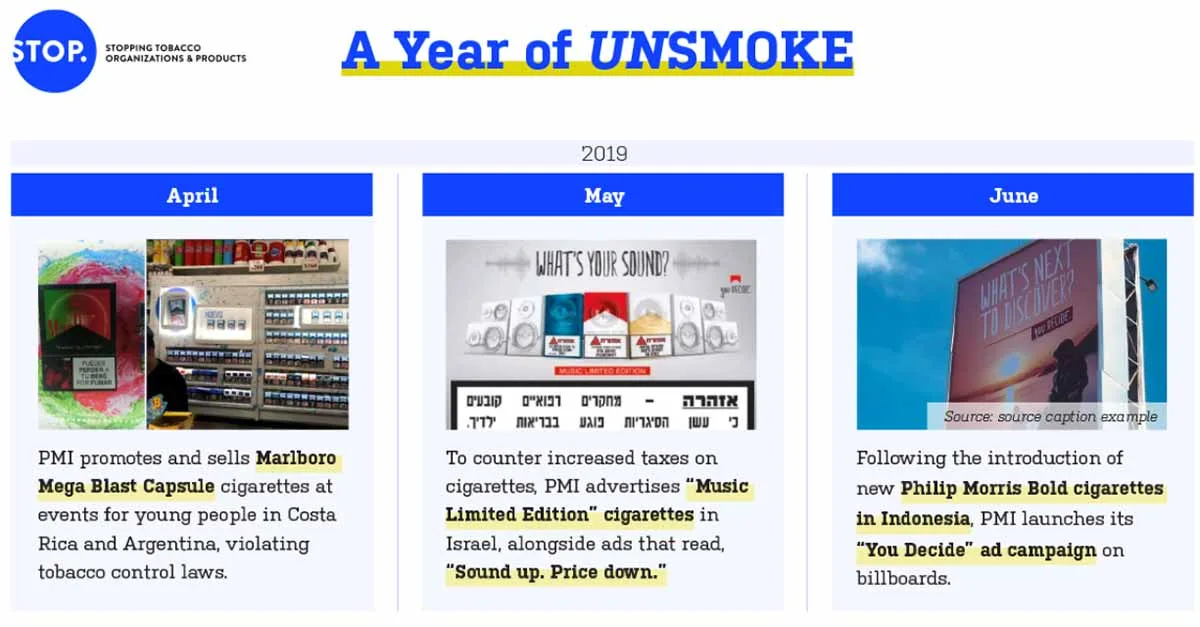- Resources
- News
-
-
Get Email Updates
Sign up for STOP's emails and never miss an update on our latest work and the tobacco industry's activity.
-
Get Funding
Ready to tackle industry interference? You could be eligible for a grant.
-
Share a Tip
Do you have information on tobacco industry misconduct in your country? Let us know.
-
Get Email Updates

A lot has changed since 2019. But one thing hasn’t: Philip Morris International (PMI) continues to sell hundreds of billions of cigarettes every year.
That might not seem remarkable. PMI is the largest transnational tobacco company in the world. What makes that fact noteworthy, however, is that it directly contradicts a major PR initiative PMI launched in 2019 called the “Year of Unsmoke,” part of its larger “Unsmoke Your World” campaign. The campaign emphasizes creating “a smoke-free future,” yet PMI’s actions since 2019 show it’s more likely to create a future of tobacco-related disease.
Failure in its first year
In April 2020, to mark the one-year anniversary of the launch of the “Year of Unsmoke,” we looked back to see if PMI had made any progress on its promises. Instead of progress, we found one action per month in that first year alone that showed PMI was failing to “unsmoke” the world.
PMI expanded its cigarette production capabilities in Uzbekistan. It promoted and sold flavored cigarettes to young people at music festivals in Costa Rica and Argentina. It advertised special “Music Limited Edition” cigarettes in Israel. These were only some of the actions PMI had taken in just one year since launching its “Unsmoke” campaign that suggested its words couldn’t be taken at face value. This month, on the third anniversary of the campaign, we looked back again.
Two years later, “Unsmoke” is still a joke
Evidence shows PMI continues to take actions that undermine the goals of the “Unsmoke Your World” campaign. PMI has continued to manufacture and sell cigarettes, market tobacco and nicotine products to young people and fight proven tobacco control policies that would actually reduce smoking rates. Here are just a few examples of why PMI’s goal of a “smoke-free future” is disingenuous.
From 2019 to 2021, PMI shipped more than a trillion cigarettes.[1]
The numbers show that PMI is still, first and foremost, a cigarette company, no matter how much it tries to rebrand itself. Since the launch of the “Unsmoke” campaign alone, it has shipped 1.9 trillion cigarettes, representing an average global market share of 12.2%. This included a new high-nicotine, high-tar cigarette brand, Philip Morris Bold, which PMI’s Indonesian subsidiary Sampoerna advertised via billboards and on TV.
PMI doesn’t show signs of slowing down production, either.
Since the launch of the campaign, the company has opened new cigarette factories in Tanzania and Uzbekistan, and wants to build a new factory in Egypt.
PMI aggressively advertised cigarettes and promoted tobacco to young people.
One of the campaign’s intents is to increase “awareness of the urgent need to become smoke-free.” Yet since the campaign’s launch, PMI has continued to try to grow its tobacco-user base by advertising cigarettes and fighting tobacco advertising bans. Most recently, it funded a counter-campaign to try to persuade Swiss voters to vote against a tobacco advertising ban that would protect young people. (The ban ultimately passed.)
It also continues to blatantly advertise cigarettes. In Indonesia, PMI promoted Marlboro cigarettes to 90,000 young people at one of Asia’s biggest music festivals, the Djakarta Warehouse Project. It also ran YouTube ads for cigarettes in the country and was found advertising cigarettes near schools, as shown in 2020 on the U.K. news program “Dispatches” on Channel 4.

Since the launch of the “Unsmoke” campaign alone, it has shipped 1.9 trillion cigarettes…
PMI’s true priorities became apparent in its corporate communications.
At its 2019 Annual General Meeting (AGM), PMI’s CEO told shareholders, “Our combustible tobacco portfolio remains the foundation of our business.” Variations of this assurance have also been shared at subsequent AGMs. The main reason? Profits. A new report exposing the hypocrisy of PMI’s health-related claims documented how then-COO Jacek Olczak explained it to investors in 2021: “…75% of our revenues are coming from a combustible business at the very attractive margins, a very high cash conversion… .” The report also highlights that in 2021, PMI’s CFO, Emmanuel Babeau, boasted about the “continued resilience” of its global cigarette business, noting, “In recent months, PM has seen particularly good performance in combustibles in Indonesia, Mexico, Turkey, the Ukraine and Australia.”
Standing in the way of real progress in reducing tobacco use
Parties to the World Health Organization Framework Convention on Tobacco Control (WHO FCTC) have pinpointed the tobacco industry has the “most serious barrier” to implementing the tobacco control measures laid out in the WHO FCTC, a global treaty to reduce tobacco use.
Three years’ worth of evidence strongly suggests that this “Unsmoke Your World” campaign is nothing more than a PR effort. The campaign is likely part of a larger strategy to convince policymakers and the public that PMI is changing for the better, that it can be trusted to solve the tobacco epidemic it helped create that kills more than 8 million people every year. But its actions prove otherwise.
PMI has one true priority: profits. Its actions show it doesn’t genuinely want people to quit smoking cigarettes, and will continue to make and sell its addictive and deadly products anywhere it can. Policymakers and the public must see past PR campaigns like “Unsmoke,” and see PMI’s actions for what they truly are: attempts to perpetuate the tobacco epidemic.
[1] https://www.portal.euromonitor.com/portal/statisticsevolution/index
https://philipmorrisinternational.gcs-web.com/static-files/8432d686-c0bf-4a27-86e9-ec5da3d7bc26





